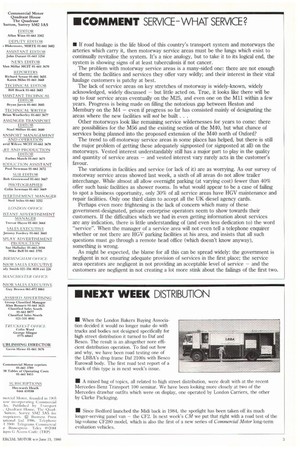• COMMENT SERVICE - WHAT SERVICE?
Page 3

If you've noticed an error in this article please click here to report it so we can fix it.
• If road haulage is the life blood of this country's transport system and motorways the arteries which carry it, then motorway service areas must be the lungs which exist to continually revitalise the system. It's a nice analogy, but to take it to its logical end, the system is showing signs of at least tuberculosis if not cancer.
. The problem with motorway service areas is a many-sided one: there are not enough of them; the facilities and services they offer vary wildly; and their interest in their vital haulage customers is patchy at best.
The lack of service areas on key stretches of motorway is widely-known, widely acknowledged, widely discussed — but little acted on. True, it looks like there will be up to four service areas eventually on the M25, and even one on the Mll within a few years. Progress is being made on filling the notorious gap between Heston and Membury on the M4 — even if progress so far has consisted mainly of designating the areas where the new facilities will not be built. . .
Other motorways look like remaining service wildernesses for years to come: there are possibilities for the M56 and the existing section of the M40, but what chance of services being planned into the proposed extension of the M40 north of Oxford?
The trend to off-motorway service areas in some places has helped, but there is still the major problem of getting these adequately signposted (or signposted at all) on the motorways. Vested interest understandably still has a major part to play in the quality and quantity of service areas — and vested interest vary rarely acts in the customer's favour.
The variations in facilities and service (or lack of it) are as worrying. As our survey of motorway service areas showed last week, a sixth of all areas do not allow trailer interchange. While almost all allow overnight parking (at varying cost) fewer than 40% offer such basic facilities as shower rooms. In what would appear to be a case of failing to spot a business opportunity, only 30% of all service areas have HGV maintenance and repair facilities. Only one third claim to accept all the UK diesel agency cards.
Perhaps even more frightening is the lack of concern which many of these government-designated, private enterprise operators seem to show towards their customers. If the difficulties which we had in even getting information about services are any indication, there is little understanding of (and even less dedication to) the word "service". When the manager of a service area will not even tell a telephone enquirer whether or not there are HGV parking facilities at his area, and insists that all such questions must go through a remote head office (which doesn't know anyway), something is wrong.
As might be expected, the blame for all this can be spread widely: the government is negligent in not ensuring adequate provision of services in the first place; the service area operators are negligent in not providing an acceptable level of service — and the customers are negligent in not creating a lot more stink about the failings of the first two.
















































































